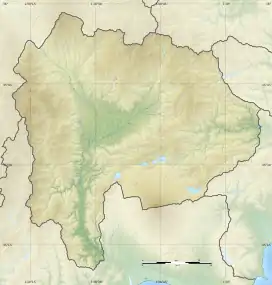Katsunuma clan residence ruins
Katsunuma clan residence ruins (勝沼氏館跡, Katsunuma-shi yakata ato) is an archaeological site consisting of the ruins of a Sengoku period fortified residence, located in what is now part of the city of Kōshū, Yamanashi in the Chūbu region of Japan. The site was designated a National Historic Site of Japan in 1981.[1]
勝沼氏館跡 | |
 Katsunuma clan residence ruins | |
 Katsunuma clan residence ruins  Katsunuma clan residence ruins (Japan) | |
| Location | Kōshū, Yamanashi, Japan |
|---|---|
| Region | Chūbu region |
| Coordinates | 35°39′32″N 138°44′00″E |
| History | |
| Periods | Sengoku period |
| Site notes | |
| Ownership | National Historic Site |

Overview
The site is located in former Katsunuma town, on a river terrace of the Higawa River at an altitude of 418 meters, strategically overlooking the old route of the Kōshū kaidō highway connecting Kai Province with Kamakura. The Katsunuma clan were a cadet branch of the Takeda clan beginning with Takeda Nobutora's brother Katsunuma Nobutomo, and the fortified residence was built by Takeda Shingen in 1560.
The site was discovered in 1973 during construction of a prefectural wine promotion center. An excavation survey was conducted from 1973 to 1977 revealed the foundations of 23 buildings in a moated compound measuring 90 meters east-west by 60 meters north-south. A wide variety of artifacts, including Chinese celadon, Haji ware pottery (used for lanterns), Tenmoku pottery, lacquerware. metal farming tools, weapons such as iron gun balls. A further survey in 2009 found traces of gold from a small forge, confirming speculation that gold ore was refined in the area.
The site is now a public park, and is approximately ten minutes from Katsunuma-budōkyō Station by car.
References
- "勝沼氏館跡" (in Japanese). Agency for Cultural Affairs.
External links
![]() Media related to Katsunuma clan residence ruins at Wikimedia Commons
Media related to Katsunuma clan residence ruins at Wikimedia Commons
- Kōshū tourist information site (in Japanese)
- Kōshū city official site {ja}}